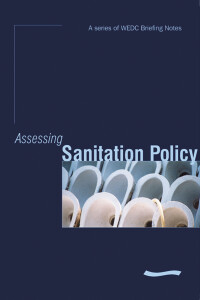-
Linking strategy and practice in urban sanitation provision
01.07.2000
There is a large gap between sanitation strategies at the policy level and actions that are practicable by those working at the municipal level. Policies should respond to and support local initiatives and sanitation plans should always be based upon a sound understanding of existing conditions. -
Sanitation policy: making it work
01.10.2006
A sanitation policy provides the framework within which efforts to improve sanitation can move from isolated projects to national programmes. But policy can only make a difference if people own it and are prepared to implement it. -
Urban sanitation - lessons from experience
01.01.2008
Providing adequate sanitation to people in rapidly growing cities, particularly those living in low-income areas, is one of the greatest development challenges of the 21st century. A number of conceptual approaches to meeting this challenge have been developed but these tend to assume conditions that rarely exist in practice. A more pragmatic approach is required, learning from what has and has not worked in the past.The paper assesses some well-known sanitation initiatives in order to establish what worked, what did not work and why. The main focus is on schemes in South Asia, involving low-cost sewerage. The analysis reveals problems with systems, not least in the coordination between different stakeholders. Further examination shows that on-site sanitation systems experience similar problems relating to the disposal of faecal wastes. The paper concludes that we need to pay renewed attention to the physical aspects of sanitation provision but within the context of an increased awareness of the importance of overall systems and recognition of the realities of conditions in the field.






